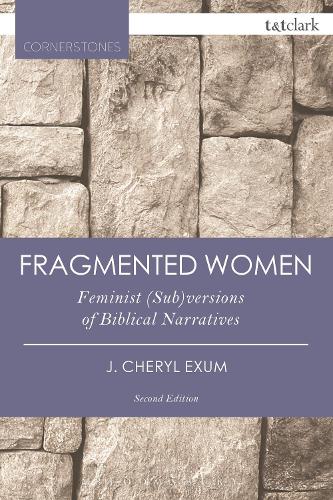
Fragmented Women: Feminist (Sub)versions of Biblical Narratives
(Paperback, 2nd edition)
Publishing Details
Fragmented Women: Feminist (Sub)versions of Biblical Narratives
By (Author) Professor J. Cheryl Exum
Bloomsbury Publishing PLC
T.& T.Clark Ltd
17th December 2015
2nd edition
United Kingdom
Classifications
Professional and Scholarly
Non Fiction
Christianity
Criticism and exegesis of sacred texts
221.6082
Physical Properties
Paperback
216
Width 156mm, Height 234mm
313g
Description
In the biblical narratives, women are usually minor characters in the stories of men. Fragments of women's stories must be gleaned from the more cohesive stories of their fathers, husbands and sons. Fragmented Women begins with the premise that, to recover shards of women's stories from androcentric texts like the Bible, it is necessary to step outside the ideology of the text, subverting the patriarchal perspective that has focused attention on the male characters. In this classic work, J. Cheryl Exum draws on feminist literary theory to critique the dominant male voice of the biblical narrative and to construct (sub)versions of women's stories from the submerged strains of their voices in men's stories. For this Cornerstones edition Exum has provided a reflective introduction on the books impact, and upon how the field has changed since it was published.
Reviews
This classic book in feminist literary readings of the Hebrew Bible reminds us anew that alternative interpretations teach us to resist the daily onslaught of androcentric and othering images, discourses, and politics, whether they appear in the Bible or in the world. Exums lucid subversions of several biblical mens stories into constructed versions of womens stories raise readerly consciousness about the power of the feminist pen even in todays post-postmodern era. * Susanne Scholz, Southern Methodist University, USA *
Cheryl Exum is remarkable for the subtlety of her interpretations. A fine literary sensibility combines with psychoanalytic finesse and an intense feminist commitment. She is very good at playing biblical characters off against each other: Bathsheba and the Levites concubine, Jephthahs daughter and Michal. She is concerned with the androcentric agenda of the narrators, and how it may be subverted both by the text and the resistant reader. Does the depiction of rape repeat the crime or question it For Exum, it does both; the male reader is both complicit and absolved. These brilliant, interconnected readings are as timely now as when they were first published. * Francis Landy, University of Alberta, Canada *
This book is a model of mature, balanced, well considered feminist criticism of the Hebrew Bible. Exum deliberately steps out of both the ideology of the text and the confines of religious exegesis, reading the biblical text as a cultural artifact, with the tools of cultural as well as traditional bible criticism. She analyses afresh fragments of biblical stories about women that are embedded in stories about men. In so doing, she affords her readers new insights and angles for understanding the texts and their influence. And by bringing the stories together, Exum manages to defragment the women, at least a little. And this is no mean achievement. * Athalya Brenner-Idan, Professor emerita, Universiteit van Amsterdam, The Netherlands *
Bloomsbury is to be much commended for making professor Exums seminal work accessible to new generations of scholars. Elegantly combining the critical and constructive tasks of feminism, Fragmented Women defies the often assumed opposition between second and third-wave. It also efficiently demonstrates how much literary readings have to gain from thoroughly questioning the surface ideology of texts. After two decades of rapid theoretical development, the impact and importance of the work appears all the more clearly. The political edge of specifically feminist criticism is not outdated and much work still remains to be done. * Mikael Larsson, University of Uppsala, Sweden *
Author Bio
J. Cheryl Exum is Emeritus Professor at the University of Sheffield, UK.
